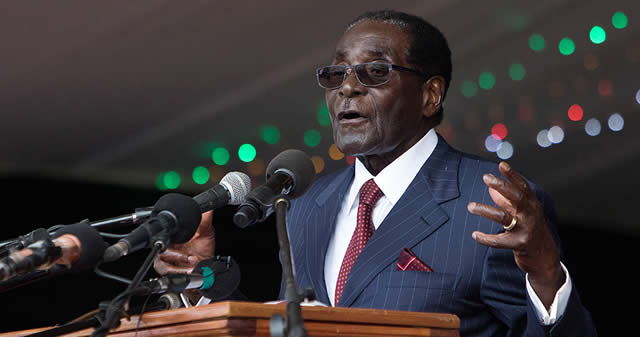President signs Paris Agreement

From Caesar Zvayi at the UNITED NATIONS
PRESIDENT Mugabe joined more than 170 heads of state and government for the historic official signing of the Paris Agreement on climate change here yesterday. The President put pen to paper at 5.36pm (Zimbabwe time), marking Zimbabwe’s commitment to see the landmark deal move towards its effective date tenable in five years time. Member states that missed yesterday’s signing ceremony have a whole year to append their signatures.
Though originally scheduled to be effective in 2020, many now expect — in the face of the overwhelming response to the signing ceremony yesterday — that the climate change agreement will enter into force long before the original deadline of 2020.
Some are even calling for immediate enforcement amid revelations by the Climate Interactive research group that the Paris pledges had instead put the world on track for 3.5 degrees Celsius of warming with a separate analysis by Climate Action Tracker, projecting warming of 2.7 degrees Celsius.
Addressing the High-Level signing of the Paris Climate Agreement yesterday, President Mugabe pledged Zimbabwe’s commitment to global efforts at climate change mitigation and adaptation saying Zimbabwe had since set up a High-Level Committee in his Office to drive the efforts.
‘‘We aim to reduce our greenhouse gas emissions by 33 percent below the projected business as usual energy emissions per capita by 2020. To demonstrate my country’s commitment to implement its Nationally Determined Contributions, I have established a High Level Committee that will be chaired by my Office.
“This platform will ensure the co-ordinated implementation and monitoring of our contributions, taking cognisance of the seriousness and cross-cutting nature of our Nationally Determined Contributions,’’ President Mugabe said.
Under the Paris Agreement that was adopted by all 196 Parties to the United Nations Framework Convention on Climate Change at COP21 in Paris last year, countries set their own greenhouse gas emission reduction targets with the objective of limiting global temperature rise to below two degrees Celsius and given the grave risks of continued warming, to strive for 1.5 degrees Celsius.
Though the targets are not legally binding on member states, countries must update them every five years. Already, member states are under pressure to do more to curb global warming amid revelations the initial targets pledged before COP21 were at variance with the Paris Agreement’s long-term objective to keep global warming below 2 degrees Celsius.
Global average temperatures have already climbed by almost one degree Celsius and last year — which was the hottest on record — saw Zimbabwe experience, first hand, a heatwave that broke decades-old temperature records culminating in some road surfaces melting and livestock dying due to heat stress.
Climate change also manifested in reduced water inflows from northern Zambia, which feeds the mighty Zambezi River, a development that has curtailed the hydro-power station’s generation capacity.
Experts contend that implementation of the Paris Agreement is essential for the achievement of the Sustainable Development Goals and provides a roadmap for climate actions that will reduce emissions and build climate resilience.
Zimbabwe and other Southern African countries are currently experiencing a severe drought that led to massive crop failure and which has since been declared a state of disaster in Zimbabwe.
‘‘Climate change is a stark reality. It is no longer a projected phenomenon. Zimbabwe and many other countries in the Southern Africa region are currently suffering from the worst drought in over thirty five years.
“This E1 Nino-induced drought has led to widespread crop failure, loss of livestock and wildlife, inadequate water supply and a drastic reduction in hydro-electric power generation.
‘‘The current drought further compounds the damage already caused to people’s livelihoods, to our economies and to flora and fauna by the occurrence, with alarming regularity, of highly variable climatic conditions in recent years. Urgent and comprehensive action is needed, at all levels, to address these negative impacts of climate change,’’ President Mugabe said.
Zimbabwe, President Mugabe said, had since developed a comprehensive programme that will enable the establishment of robust development of a Monitoring and Reporting Framework for the implementation of the Nationally Determined Contributions with the assistance of the United Nations Development Programme.
‘‘The broader scope of the programme will support enhanced climate action towards climate resilience and a low carbon development pathway. “In our determination to accelerate climate action, we have developed and are implementing a National Climate Change Response Strategy that seeks to mainstream climate change across all the economic sectors, in particular agriculture, water, energy, industry and tourism.
“The strategy will be supported by the National Climate Policy which has been validated by all stakeholders and will shortly be adopted by Government,’’ President Mugabe said.









Comments